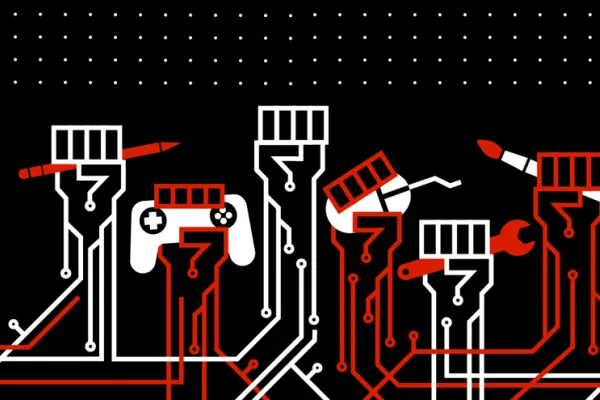CODE-CWA Newsletter: March 12

“This union builds upon years of passionate organizing by Floyd County Production workers. We are excited to work together as a collective to continue building a workplace where everyone receives their fair share and can thrive in a culture of mutual respect and transparency.” -- Margeaux McClelland, a 3d texture artist at the studio.
As workers at Floyd County Productions, the largest animation studio in Georgia, requested their management to voluntarily recognize their newly formed union with CODE-CWA, Glitch tech workers (and CWA members) signed a historic collective bargaining agreement with their company, nearly a year after their union was voluntarily recognized by Glitch management.
These examples stand in stark contrast to companies like Amazon and Kickstarter, which have gone to great lengths to discourage employees from unionizing. In Alabama, Amazon has been running a brutal anti-union campaign for months as warehouse workers in Bessemer organize their own historic union. In 2019, Kickstarter fired two highly visible union organizers. Last fall, the company reached a settlement with the National Labor Relations Board after it found sufficient evidence that one of those firings was retaliation for organizing.
Union organizing has been an elusive phenomenon in Silicon Valley. In this newsletter we give you the latest on the steps tech employees are taking to organize and form unions.
Through our support of workers across the tech, games, and digital industries we have seen a cultural shift as workers turn to each other to bring the change they seek. This commitment to building democracy in the workplace will impact all of us. Are you looking to organize your workplace? Reach out. We are waiting to organize with you.
Events
On March 14, join us at 12PM PST for a class on how to build a strong organizing committee, maintain it, and build a strong foundation from which you can run a successful campaign. This is Class 2 in a series. So while ideally students should take Class 1 first, it's not required. Sign up here.
Worker News
Glitch workers sign tech’s first collective bargaining agreement
In a historic milestone for the tech industry, Glitch workers have signed a collective bargaining agreement with the company. The contract, which was ratified overwhelmingly by union members, will last for 11 months. It’s the first agreement signed by white collar tech workers in the United States, according to a press release from the Communications Workers of America (CWA). The contract went into effect on February 28. The agreement — a legal contract between the union and the company — does not include higher wages, which weren’t a focus for union members. Union representatives say they might try to include these in a future contract, but for now they recognize that Glitch is a small startup operating during a pandemic with pay and benefits that are already generous. “There’s a lot of fear that you can’t be nimble with a union in the tech industry, but this shows there are ways to do it,” says Sheridan Kates, a senior software engineer and bargaining committee representative. “We have an 11-month contract, we didn’t focus on wages and benefits. We didn’t want to hamstring Glitch. We wanted to see ourselves as partners with management and codify the things that are important to us as a union.” Glitch laid off a third of its workforce in 2020. Read more on the Verge.
New Union at Georgia’s Largest Animation Studio Awaits Recognition
Management at Floyd County Productions, the largest animation studio in the state of Georgia, which is behind the popular animated series Archer, was requested by more than half their workers to voluntarily recognize a newly formed union. The union known as Floyd County Productions Guild has been created with support from the Communications Workers of America’s CODE-CWA project. It will be the first union open to 150 workers at Floyd County Productions, since it was founded in 2009. Around 100 workers expressed interest and more than 80 have signed a request for union representation, organizers said. The union includes artists, animators, IT workers, editors, systems engineers, background artists, layout artists and more. If Floyd County Productions does not voluntarily recognize the union, employees can take the request to the National Labor Relations Board (NLRB). If the NLRB receives a petition from at least 30% of affected employees, officials could arrange for workers to vote on joining the union. Read more on Cartoon Brew.
Demand Google contractor HCL America, Inc. stop breaking the law. HCL America, Inc. has been illegally refusing to bargain in good faith with the United HCL Workers of Pittsburgh to reach an agreement on a fair union contract. In 2019, tech workers tech workers employed by the Google contractor HCL Technologies proudly announced their victory in winning their union election. About 80 employees came together seeking a voice on the job, forming the United HCL workers of Pittsburgh, affiliated with the United Steelworkers (USW). These workers represent the majority of Google workers that are relegated to contractors within Google’s segregative two tiered employment system. Since the formation of their unions the United HCL Workers have worked tirelessly to negotiate a fair contract with HCL management. HCL has refused to engage in fair bargaining and thus, the unionized workers are asking for your support. Please sign and share their petition demanding that HSCL management reach an agreement with their workers. Read and sign the petition HERE.
Black Amazon manager sues company alleging discrimination and harassment
A senior Amazon manager and former economic policy adviser to Senator Cory Booker is suing the tech giant and two of its current executives for alleged race and gender discrimination, and for allegedly violating the Equality Pay Act, according to a lawsuit filed in district court in Washington, DC, on March 1. The suit alleges that her first boss employed what she believed were racial stereotypes in telling her that her communication style was “too direct,” and “just scary,” and that she “can intimidate people”. The suit also alleges that a former Amazon executive sexually harassed and assaulted her, on several occasions, including propositioning her for sex, and groping her under a table at a work dinner. “There’s been deep emotional pain,” the plaintiff Charlotte Newman said in an interview. “All of the hard work, all of the sacrifices I made, my education — none of that saved me from someone who’s a predator and living in fear of what else he might do.” Amazon has said it’s currently investigating the allegations. Read more on Recode.
Filing lawsuit, activists say Clearview AI “is a surveillance nightmare for all of us”
Clearview AI has amassed a database of more than 3 billion photos of individuals by scraping sites such as Facebook, Twitter, Google and Venmo. It’s bigger than any other known facial-recognition database in the U.S., including the FBI’s. Since it was founded in 2017, Clearview AI technology has been adopted by more than 2,400 law enforcement agencies in the U.S.. After the January riot in the U.S. Capitol, the company saw a 26% jump in law enforcement’s use of the tech. Civil liberties advocates and activists allege in a lawsuit filed on March 9 that the company’s automatic scraping of their images and its extraction of their unique biometric information violate privacy and chill protected political speech and activity. The plaintiffs — four individual civil liberties activists and the groups Mijente and NorCal Resist — allege Clearview AI “engages in the widespread collection of California residents’ images and biometric information without notice or consent.” “Imagine thousands of police officers and ICE agents across the country with the ability to instantaneously know your name and job, to see what you’ve posted online, to see every public photo of you on the internet,” said Jacinta Gonzalez, a senior campaign organizer at Mijente. “This is a surveillance nightmare for all of us, but it’s the biggest nightmare for immigrants, people of color, and everyone who’s already a target for law enforcement.” Read more on the LA Times.
Biden’s new labor advisor has ties to CA Prop 22
President Biden tapped Seth Harris, a former Obama labor official, to serve as a top advisor on labor issues. Harris was the co-author of a policy paper that Uber and other tech companies used as a jumping off point for their CA Prop 22 legislation. In that paper, Harris and his co-author argued that gig workers were neither employees nor independent contractors, and that a third type of classification was needed. Harris has also faced criticism for working at the law firm Dentons which represented employers including Walmart Inc. in labor disputes. Harris joined the White House soon after Biden urged Amazon workers to vote in an election to unionize an Amazon warehouse in Alabama, without outright endorsing the union. Read more on Bloomberg.com.
The PRO Act passes the house. The PRO Act is the most significant pro-worker federal labor law reform since 1935. It levels the playing field by giving workers a fair shot at having a union. Protecting the right for workers to organize will help restore workers’ ability to stand together with their co-workers to negotiate for better pay, benefits, and working conditions. Increasing protections for worker organizing will ensure working people have the power to collectively win the pay and benefits they deserve. This is a key step in ensuring a just economic recovery for all. Read more on NPR.
This Week in Labor History
March 8, 1908: Ten thousand women workers in the needle trades, mostly Jewish and Italian, took to the New York City streets to demand higher wages, shorter hours, and an end to child labor. This demonstration helped spark the establishment of March 8 as International Women’s Day in 1911.
March 8, 1926: Eighteen years later, on International Women’s Day, amid a massive strike of fur workers in New York, Ben Gold, Communist leader of the Fur and Leather Workers Union, called out 10,000 workers, mostly women, for mass picketing. Ultimately, the strikers won a 10 percent raise and a 40-hour, five-day work week. Read more here.
Song of the Week
Working girl, livin' in a man's world
Working girl, you gotta take a stand, girl
The boss checks out her body
She's on the telephone tellin' his lies
Mama had to play someone else's game
Someday she's breakin' the chain
Nobody knows the dreams she dares to dream
Or the plans she has made
Or the times she has prayed inside
Or what tears at her pride
Working girl, livin' in a man's world
Working girl, you gotta take a stand, girl
CODE-CWA Newsletter: February 21, 2025

